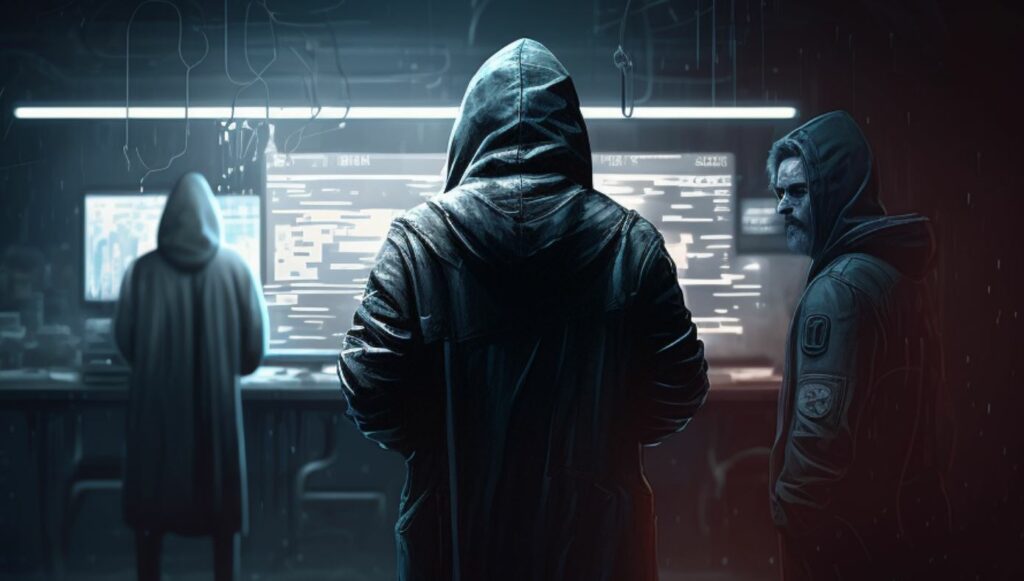
L’uso sempre più diffuso delle tecnologie digitali ha aperto nuove opportunità per i criminali informatici che operano online, dando vita a un vero e proprio ecosistema del cybercrime. In questo contesto, esistono diverse figure che possono mettere a rischio la sicurezza informatica di privati, imprese e governi.
In questo articolo, ci concentreremo sulle tre principali categorie di crimini informatici, che agiscono per motivi di profitto, di hacktivismo utilizzando le loro abilità per scopi politici o sociali, e gli hacker di stato, che operano per conto di governi o organizzazioni statali.
Analizzeremo il modus operandi di ciascuna di queste figure, le loro motivazioni, i danni che possono causare e le conseguenze delle loro azioni sulla società e sulla politica internazionale. Inoltre, discuteremo delle leggi che regolano le attività degli hacker e delle misure che possono essere adottate per proteggere i dati e la privacy dei cittadini.

La differenza tra “hacker” e “criminale informatico” è importante da capire prima di addentrarci a comprendere le differenze tra le tipologie di crimini informatici.
In generale, un hacker è una persona che vuole superare gli ostacoli con intelletto, arte e ingegno, spesso motivato da uno scopo etico e quindi migliorare le tecnologie con la quale si cimenta. L’hacker, quindi, può essere considerato un innovatore.
L’hacking, in questo senso, è presente in tutte le discipline, non solo nell’ambito informatico. Ad esempio, un hacker può essere un artista che utilizza materiali non convenzionali per creare opere d’arte, o un ingegnere che inventa nuovi modi per risolvere problemi tecnici o un musicista che crea un nuovo strumento per generare nuove melodie.
Il criminale informatico invece utilizza è un hacker che utilizza queste capacità per commettere reati, spesso a scopo di lucro. Questo può includere il furto di informazioni personali o finanziarie, il danneggiamento di sistemi informatici o la diffusione di virus informatici. A differenza degli hacker etici, i criminali informatici cercano di violare i sistemi informatici per ottenere un proprio tornaconto, spesso economico, e non per generare valore per tutta la comunità.
In sintesi l’hacking è una “capacità” che può essere utilizzata sia per fini nobili, che per fini illeciti.
I “criminali informatici da profitto” sono individui o gruppi che utilizzano le loro abilità informatiche per commettere reati a scopo di lucro. Questi criminali cercano di ottenere denaro o altri benefici attraverso l’accesso non autorizzato ai sistemi informatici o ai dati delle vittime.
Tra le attività più comuni svolte dai criminali informatici da profitto ci sono il furto di dati sensibili come numeri di carte di credito, password, informazioni finanziarie o personali, la diffusione di virus informatici, l’estorsione di denaro da parte delle vittime, il dirottamento di server web e l’utilizzo delle risorse computazionali delle vittime per attività illecite.
I criminali informatici da profitto possono agire da soli o in gruppi organizzati, spesso in modo nascosto e anonimo. Utilizzano tecniche sofisticate di hacking e di ingegneria sociale per ingannare le vittime e penetrare nei sistemi informatici. Il loro obiettivo principale è quello di ottenere un vantaggio finanziario, ma il danno causato alle vittime può essere significativo, sia a livello economico che di reputazione.

I “national state actors” sono attori statali che utilizzano le proprie risorse e capacità informatiche per perseguire obiettivi di politica estera o di sicurezza nazionale attraverso attività di hacking e di spionaggio informatico. Questi attori includono governi, agenzie di intelligence e militari, che cercano di acquisire informazioni riservate (come la proprietà intellettuale) o di danneggiare le infrastrutture critiche dei loro avversari.
I “national state actors” utilizzano tecniche sofisticate di hacking e di ingegneria sociale per compromettere i sistemi informatici dei loro obiettivi, e possono agire sia in modo nascosto e furtivo che in modo aperto e dichiarato. Le loro attività di hacking possono includere il furto di informazioni sensibili, la manipolazione di dati, l’intercettazione di comunicazioni, il sabotaggio di infrastrutture critiche e altre attività di spionaggio informatico.
I “national state actors” possono agire in modo indipendente o in collaborazione con altri attori statali o non statali. Le loro attività possono causare significativi danni alla sicurezza nazionale e alla privacy delle persone coinvolte.
Gli “hacktivisti” sono individui o gruppi di hacker che utilizzano le loro abilità informatiche per perseguire obiettivi di attivismo politico, sociale o culturale. Gli “hacktivisti” cercano di utilizzare le tecniche di hacking per promuovere la libertà di espressione, la trasparenza, la giustizia sociale e altri obiettivi politici attraverso l’azione diretta online.
La “dichiarazione di hacktivismo” dei CDC, o “Cult of the Dead Cow”, è stata una dichiarazione pubblicata nel 1996 svolta da un gruppo di hacker americani che ha contribuito a definire il concetto di “hacktivismo”. La dichiarazione ha stabilito una serie di principi fondamentali per l’azione hacktivista, tra cui la difesa della libertà di espressione e la protezione della privacy online.
Il movimento hacktivista è nato a metà degli anni ’90, quando il crescente accesso a Internet ha permesso a un numero sempre maggiore di persone di accedere a informazioni e di comunicare tra loro. Molti gruppi di hacker hanno iniziato a utilizzare le loro abilità informatiche per promuovere obiettivi politici e sociali, come la lotta per la libertà di espressione, la trasparenza e la giustizia sociale.
Nel corso degli anni, il movimento hacktivista è cresciuto e si è evoluto, assumendo diverse forme e utilizzando diverse tattiche per raggiungere i propri obiettivi. Tra le attività svolte dagli hacktivisti ci sono il defacement di siti web, la diffusione di informazioni riservate, la creazione di software libero e l’organizzazione di proteste online.
Il movimento hacktivista ha generato un dibattito sulla legittimità e l’efficacia dell’azione diretta online, ma ha anche contribuito a porre l’attenzione su importanti questioni politiche e sociali, come la libertà di espressione, la privacy e la giustizia sociale.

In Italia, il crimine informatico è disciplinato dal Codice Penale e dalla legge 48/2008, che ha introdotto nuove disposizioni in materia di crimine informatico e di sicurezza informatica.
Il Codice Penale italiano prevede diverse fattispecie di reato informatico, tra cui accesso abusivo a un sistema informatico, violazione di segreti d’ufficio informatici, diffusione di virus informatici, frode informatica, danneggiamento informatico, truffa informatica, e altri reati informatici.
La legge 48/2008 ha introdotto il reato di “cyberstalking”, ovvero la persecuzione telematica di una persona, ed ha disciplinato la conservazione dei dati di traffico delle comunicazioni elettroniche, tra cui i dati relativi alla navigazione su Internet.
In Italia, le autorità competenti per le indagini e le azioni giudiziarie in materia di crimine informatico sono la Polizia Postale e delle Comunicazioni e la Procura della Repubblica presso il Tribunale competente.
È importante sottolineare che il crimine informatico è una realtà in continua evoluzione e che la normativa italiana si evolve di conseguenza, al fine di contrastare le nuove minacce e le nuove forme di reato informatico che emergono costantemente.
In conclusione, abbiamo visto che il mondo del cybercrime è composto da diversi attori, tra cui criminali informatici da profitto, hacktivisti e hacker di stato, ognuno con motivazioni e obiettivi diversi. Abbiamo anche analizzato le leggi sul crimine informatico in Italia, che si sono evolute negli anni al fine di contrastare le nuove minacce informatiche.
È evidente che la sicurezza informatica è diventata un tema di crescente importanza, sia per le imprese che per le istituzioni governative. È quindi essenziale che le aziende e gli enti governativi si dotino di adeguati strumenti e politiche per proteggere i loro sistemi informatici e i dati sensibili dei propri utenti.
Inoltre, è importante sensibilizzare l’opinione pubblica sulle tematiche della sicurezza informatica, al fine di prevenire il rischio di cadere vittima di attacchi informatici. Solo attraverso una maggiore consapevolezza e attenzione alle questioni di sicurezza informatica, sarà possibile contrastare efficacemente la crescente minaccia del cybercrime.
Ti è piaciuto questo articolo? Ne stiamo discutendo nella nostra Community su LinkedIn, Facebook e Instagram. Seguici anche su Google News, per ricevere aggiornamenti quotidiani sulla sicurezza informatica o Scrivici se desideri segnalarci notizie, approfondimenti o contributi da pubblicare.

 Innovazione
InnovazioneL’evoluzione dell’Intelligenza Artificiale ha superato una nuova, inquietante frontiera. Se fino a ieri parlavamo di algoritmi confinati dietro uno schermo, oggi ci troviamo di fronte al concetto di “Meatspace Layer”: un’infrastruttura dove le macchine non…
 Cybercrime
CybercrimeNegli ultimi anni, la sicurezza delle reti ha affrontato minacce sempre più sofisticate, capaci di aggirare le difese tradizionali e di penetrare negli strati più profondi delle infrastrutture. Un’analisi recente ha portato alla luce uno…
 Vulnerabilità
VulnerabilitàNegli ultimi tempi, la piattaforma di automazione n8n sta affrontando una serie crescente di bug di sicurezza. n8n è una piattaforma di automazione che trasforma task complessi in operazioni semplici e veloci. Con pochi click…
 Innovazione
InnovazioneArticolo scritto con la collaborazione di Giovanni Pollola. Per anni, “IA a bordo dei satelliti” serviva soprattutto a “ripulire” i dati: meno rumore nelle immagini e nei dati acquisiti attraverso i vari payload multisensoriali, meno…
 Cyber Italia
Cyber ItaliaNegli ultimi giorni è stato segnalato un preoccupante aumento di truffe diffuse tramite WhatsApp dal CERT-AGID. I messaggi arrivano apparentemente da contatti conosciuti e richiedono urgentemente denaro, spesso per emergenze come spese mediche improvvise. La…